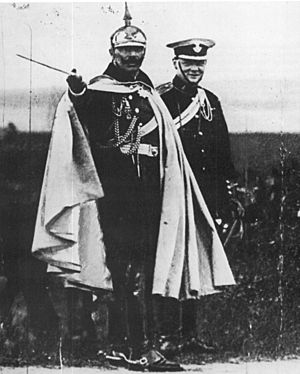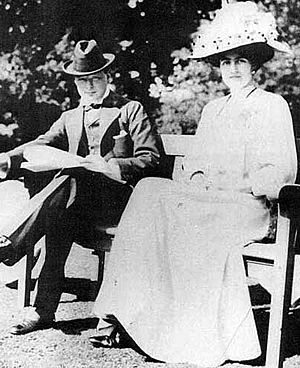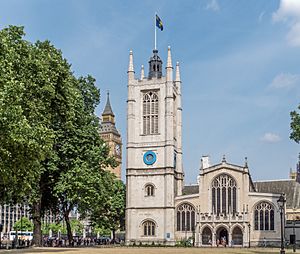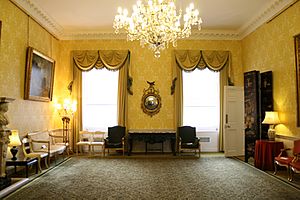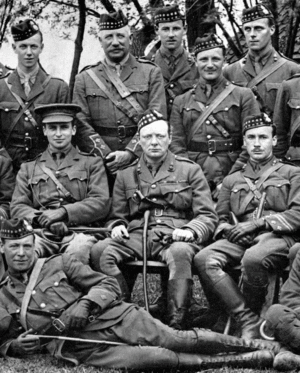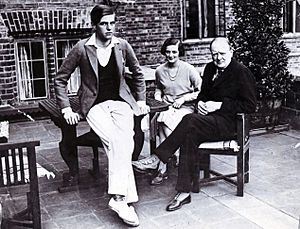Winston Churchill's Liberal Party years, 1904–1924 facts for kids
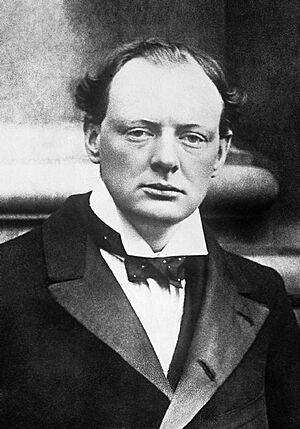
Winston Churchill was first elected to the UK Parliament in 1900. He was a Conservative Party member for the Oldham area. He became a Member of Parliament (MP) in February 1901. However, he soon disagreed with the Conservative government. On May 31, 1904, he officially left the Conservatives. He joined the opposition Liberals. He stayed a Liberal until March 1924.
During this time, Churchill wrote less. He finished a two-volume book about his father in 1906. His next big book, The World Crisis, was started much later in 1921. He married Clementine Hozier in September 1908. Their first child, Diana, was born in July 1909. As a Liberal, Churchill held several important jobs in the government. He was Home Secretary (1910–1911) and First Lord of the Admiralty at the start of World War I.
He was largely blamed for the failed Gallipoli campaign in 1915. He resigned from the government in November 1915. He then rejoined the Army. In January 1916, he became a temporary lieutenant-colonel. He commanded a battalion of the Royal Scots Fusiliers near Ploegsteert in Belgium. After a military merger, he left his command and returned to politics.
In July 1917, Churchill became Minister of Munitions. This job involved making weapons and supplies for the war. He supported the Representation of the People Act 1918. This law gave some women the right to vote. In January 1919, he became both Secretary of State for War and Secretary of State for Air. In February 1921, he became Secretary of State for the Colonies. Churchill faced sadness in 1921. Both his mother and his two-year-old daughter, Marigold, passed away. His youngest child, Mary, was born in September 1922. That same month, he bought his family home, Chartwell, in Kent.
The government changed in November 1922. Churchill lost his seat as MP for Dundee. He had represented Dundee since 1908. Out of Parliament, he focused on painting and writing The World Crisis. In December 1923, he tried to win a seat for the Liberals again. He ran in Leicester West but lost. He was defeated again in March 1924. He became very unhappy with the Liberal Party.
In May 1924, he spoke at a Conservative meeting. He said the Liberal Party was no longer strong. He urged Liberals to support the Conservatives. He wanted them to defeat the Labour Party and stop socialism. In October, after talking with Prime Minister Stanley Baldwin, Churchill ran as a "Constitutionalist" candidate. He won the election in Epping. Baldwin then made him Chancellor of the Exchequer. Churchill officially left the Liberal Party and rejoined the Conservative Party.
Contents
Churchill as a Liberal MP: 1904–1908
In the early 1900s, Churchill was a Conservative MP. He was becoming unhappy with his party's ideas. On May 31, 1904, he made a big move. He "crossed the floor" of the House of Commons. This meant he left the Conservatives to join the Liberal Party. His cousin, Ivor Guest, followed him.
People have suggested many reasons for Churchill's change. These include wanting a government job or wanting to help the poor. But the main reason was his disagreement with the Conservatives over trade taxes. He may have simply felt more aligned with the Liberals. He once told another MP, "I'm a Liberal. Always have been." As a Liberal, he continued to support free trade.
In December 1905, the Prime Minister resigned. The Liberal leader, Henry Campbell-Bannerman, took his place. He called a general election for January 1906. The Liberals won a big victory. Churchill won the Manchester North West seat. In January, Churchill's book about his father was published. He received a large payment for it. It was very popular.
In the new government, Churchill became Under-Secretary of State for the Colonial Office. This was a junior government role. He worked under the main Secretary of State. His first job was to help write a constitution for the Transvaal. In 1906, he helped grant a government to the Orange River Colony. He worked to ensure fairness between the British and the Boer people in South Africa. He also announced a plan to stop using Chinese workers who were forced to work. He worried about relations between European settlers and black Africans. After the Bambatha Rebellion by the Zulu in Natal, he spoke out against the "disgusting butchery of the natives."
In August 1906, Churchill went on holiday in France. He played polo and gambled. He then traveled to Paris, Switzerland, Berlin, and Silesia. He was a guest of Kaiser Wilhelm II in Germany. After that, he visited Venice and toured Italy. In May 1907, he holidayed in Biarritz. In the autumn, he toured Europe and Africa. He traveled through France, Italy, Malta, and Cyprus. He then went through the Suez Canal to Aden and Berbera. He sailed to Mombasa and traveled by train through Kenya Colony. He stopped for big game hunting in Simba. He then went through the Uganda Protectorate and sailed up the River Nile. He wrote about his travels for Strand Magazine. Later, he published them as a book called My African Journey.
Asquith Government: 1908–1915
President of the Board of Trade: 1908–1910
When Asquith became Prime Minister in 1908, Churchill was promoted. He joined the Cabinet as President of the Board of Trade. At 33, he was the youngest Cabinet member since 1866. New Cabinet ministers had to seek re-election. In April, Churchill lost the Manchester North West by-election. The Liberals then put him forward for a by-election in Dundee. This was a safe Liberal seat in Scotland. He won easily.
In his new role, Churchill worked with David Lloyd George. They pushed for social reforms. Churchill said that while some people enjoyed life, others faced "crueller" conditions. To fix this, he wanted more "State intervention and regulation." His ideas were similar to those in Germany. His speeches on these topics were published in books.
One of his first tasks was to settle a dispute. This was between ship-workers and their bosses on the River Tyne. He then set up a court to handle future worker disputes. He became known as someone who could bring people together. Churchill believed workers should have shorter hours. He supported the Mines Eight Hours Bill. This law limited miners to an eight-hour day. He also introduced the Trade Boards Bill. This bill would set up a Board of Trade. It would prosecute unfair employers. It would also set a minimum wage and ensure meal breaks for workers. The bill passed easily. In May, he proposed the Labour Exchanges Bill. This aimed to create over 200 offices. These offices would help unemployed people find jobs. He also suggested an unemployment insurance plan. The government would help fund it.
To pay for these reforms, he and Lloyd George argued against increasing warship production. Churchill made fun of those who thought war with Germany was unavoidable. In autumn 1909, he visited Germany. He spent time with the Kaiser and watched German Army exercises.
In his personal life, Churchill asked Clementine Hozier to marry him. They married in September at St Margaret's, Westminster. They honeymooned in Italy and Moravia. They then settled in London. The next July, their daughter Diana was born.
To make their social reforms law, the Liberal government proposed the People's Budget. Conservatives opposed it. Churchill became president of the Budget League, which supported it. The budget passed in the House of Commons. But it was rejected by the Conservative-dominated House of Lords. This threatened Churchill's reforms. Churchill warned that this would anger working-class people. It could lead to class war. To break the deadlock, the government called an election in January 1910. The Liberals won narrowly. Churchill kept his seat in Dundee. After the election, he suggested getting rid of the House of Lords. In April, the Lords gave in, and the budget passed.
Home Secretary: 1910–1911
In February 1910, Churchill became Home Secretary. This put him in charge of the police and prisons. He started a prison reform program. He made a difference between regular criminals and political prisoners. Rules for political prisoners were relaxed. He tried to set up libraries for prisoners. He also introduced lectures or concerts for prisoners four times a year. He reduced the time first-time offenders spent in solitary confinement. He spoke against very long sentences for some crimes. He suggested ending automatic imprisonment for those who couldn't pay fines. He stopped imprisoning young people aged 16 to 21 for less serious crimes. Out of 43 death sentences during his time, he changed 21 of them.
One big issue was women's right to vote. Churchill supported giving women the vote. But he only wanted a law if most men supported it. He suggested a public vote on the issue. But this idea was not accepted. Many Suffragettes thought Churchill was against them. They protested at his meetings. In November 1910, a suffragist attacked Churchill with a whip.
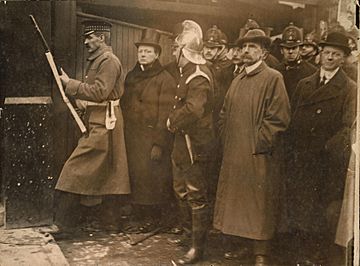
In summer 1910, Churchill spent two months on a yacht. Back in Britain, he dealt with the Tonypandy Riot. Coal miners in Wales protested their working conditions. The police chief asked for troops. Churchill allowed troops to go to nearby cities. But he stopped them from going into the riot area. He worried about bloodshed. Instead, he sent 270 London police officers. They did not have guns. As the riots continued, he offered the protesters a meeting with a government mediator. They accepted. Churchill privately thought both the mine owners and strikers were "very unreasonable." Some newspapers said he was too soft on the rioters. But many in the Labour Party thought he was too harsh.
Asquith called another general election for December 1910. The Liberals won again. Churchill kept his Dundee seat.
In March 1911, he introduced the Coal Mines Bill. This law brought in stricter safety rules for coal mines. He also created the Shops Bill. This aimed to improve working conditions for shop workers. It faced opposition and passed in a weaker form. He became president of the Early Closing Association to keep pressure on the issue. In April, Lloyd George introduced health and unemployment insurance. Churchill helped write this law. In May, his wife gave birth to their second child, Randolph. He was named after Churchill's father. In 1911, Churchill dealt with growing unrest. He sent troops to Liverpool to stop protesting dockers. He also rallied against a national railway strike. When the Agadir Crisis threatened war between Germany and France, Churchill suggested an alliance. He wanted Britain to join France and Russia. He also wanted to protect Belgium, the Netherlands, and Denmark from Germany. The Agadir Crisis greatly changed Churchill's views on the need for a stronger navy.
First Lord of the Admiralty
In October 1911, Asquith appointed Churchill First Lord of the Admiralty. He moved into Admiralty House in London. For the next two and a half years, he focused on preparing the navy. He visited naval bases and shipyards. He worked to improve naval morale. He also closely watched German naval developments. After Germany increased warship production, Churchill promised Britain would build two ships for every one Germany built. He believed war could be avoided if Germany's "democratic forces" took control. He invited Germany to reduce naval building together, but they refused.
As part of his naval reforms, he pushed for higher pay for naval staff. He also wanted more recreational facilities. He increased submarine building. He focused on the Royal Naval Air Service. He encouraged them to experiment with military aircraft. He invented the word "seaplane" and ordered 100 to be built. In 1913, he started flying lessons. His friends urged him to stop because it was dangerous. Some Liberals disagreed with his high naval spending. In December 1913, he threatened to resign if his plan for four new battleships was rejected. In June 1914, he convinced Parliament to buy a 51% share in the Anglo-Persian Oil Company. This secured oil for the Royal Navy. He also supported eugenics and helped draft the Mental Deficiency Act 1913.
A major issue was Irish home rule. In 1912, Asquith's government proposed the Home Rule Bill. This would grant Ireland self-government. Churchill supported the bill. He urged Ulster Unionists to accept it. These were mostly Protestants who wanted to stay part of Britain. He was against dividing Ireland. In 1913, he suggested Ulster could have some freedom from an independent Irish government. Many Ulster Unionists rejected any plan that put them under Dublin's rule. The Ulster Volunteers threatened to fight to create an independent Protestant state. Churchill was the minister who gave them an ultimatum in a speech in March 1914. Following a Cabinet decision, he increased the naval presence in Ireland. This was to deal with any Unionist uprising. Conservatives accused him of trying to start an "Ulster Pogrom." Churchill then suggested Ireland remain part of a federal United Kingdom. This angered Liberals and Irish nationalists.
Outbreak of the First World War
After the assassination of Archduke Franz Ferdinand in June 1914, war talk grew in Europe. Churchill began preparing the navy. Many Liberals opposed war. But the British Cabinet declared war when Germany invaded Belgium. Churchill was in charge of Britain's naval war effort. In two weeks, the navy moved 120,000 British troops to France. In August, he oversaw a naval blockade of German ports. This stopped food from being transported by sea. He also sent submarines to the Baltic Sea to help the Russian Navy. Also in August, he sent troops to Ostend. This forced Germans to move some of their soldiers away from their main attack.
In September, Churchill took full charge of Britain's air defense. He visited France several times to oversee the war. In Britain, he spoke at rallies to encourage people to join the army. His wife gave birth to their third child, Sarah. In October, he visited Antwerp to see Belgian defenses against the Germans. He promised Belgian Prime Minister Charles de Broqueville that Britain would send more troops. The German attack continued. Soon after Churchill left, he agreed to a British retreat. The Germans took Antwerp. Many in the press criticized Churchill. But Churchill said his actions helped prolong the resistance. This allowed the Allies to secure Calais and Dunkirk.
In November, Asquith called a War Council. Churchill proposed a plan to take the island of Borkum. He believed this would shorten the war. Churchill also supported the development of the tank. He thought it would help with trench warfare. He used navy funds to create it. To help the Russians in the Caucasus, Churchill supported a plan. This plan was to attack the Turkish Army in the Dardanelles. The hope was to seize Constantinople. In March, a fleet of 13 battleships attacked. But they faced problems from underwater mines. In April, troops began their attack at Gallipoli. Many MPs, especially Conservatives, blamed Churchill for these failures. Under Conservative pressure, Asquith formed a coalition government in May. The Conservatives' condition was that Churchill be removed from the Admiralty. Churchill pleaded his case but accepted a lesser role. He became Chancellor of the Duchy of Lancaster.
Military Service, 1915–1916
In November 1915, Churchill resigned from the government. He remained an MP. He moved into his brother's home. He and his family spent weekends at a farmhouse near Godalming. There, he started painting, which became a lifelong hobby.
In November, Churchill joined the 2nd Battalion, Grenadier Guards, on the Western Front. After a short trip home for Christmas, he was promoted in January 1916. He became a temporary lieutenant-colonel. He commanded the 6th Battalion, Royal Scots Fusiliers. After training, his battalion moved to a part of the Front near Ploegsteert in Belgium. Churchill spent three and a half months there. His battalion faced constant shelling. He narrowly escaped death when a piece of shrapnel fell near him. In March, he returned home briefly. He gave a speech on naval issues to Parliament. In May, his battalion merged with another. Churchill did not ask for a new command. He got permission to leave active service. His temporary promotion ended on May 16. He returned to the rank of major.
Back in Parliament, Churchill spoke about war issues. He called for conscription for the Irish. He also wanted more recognition for soldiers' bravery. He pushed for steel helmets for troops. However, he felt frustrated with little to do. The failure of the Dardanelles campaign still affected him. The issue was often brought up by Conservatives. He argued his case before the Dardanelles Commission. Their report did not blame him for the campaign's failure.
Lloyd George Government: 1916–1922
Minister of Munitions: 1917–1919
Asquith resigned, and Lloyd George became Prime Minister in October 1916. In May 1917, Lloyd George sent Churchill to inspect the French war effort. In July, Lloyd George appointed Churchill Minister of Munitions. In this job, Churchill promised to increase weapon production. He made the department more efficient. He quickly ended a strike in weapon factories along the Clyde. He ended a second strike in June 1918. He threatened to draft the striking workers into the army. He made repeated trips to France. He visited the Front and met French leaders. In Parliament, he voted to support the Representation of the People Act 1918. This law gave some British women the right to vote for the first time. After British military gains, Germany surrendered in November. Four days later, Churchill's fourth child, Marigold, was born.
Secretary of State for War and Air: 1919–1921
After the war, Lloyd George called a new election. During the campaign, Churchill called for nationalizing railways. He also wanted control over monopolies and tax reform. He supported creating a League of Nations to prevent future wars. Churchill was re-elected as MP for Dundee. Lloyd George remained Prime Minister. In January 1919, Lloyd George moved Churchill to the War Office. He became both Secretary of State for War and Secretary of State for Air.
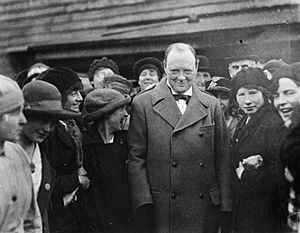
Churchill was responsible for sending British soldiers home. But he convinced Lloyd George to keep a million men in the army. These men would be used as a British Army of the Rhine. Churchill was one of the few government figures who opposed harsh actions against Germany. He said he opposed anything that would make German workers poor. He also warned against sending the German Army home too quickly. He said they might be needed to protect against threats from the new Soviet Russia.
Churchill strongly opposed Vladimir Lenin's new Communist Party government in Russia. He called it "the worst" tyranny in history. British troops were already in parts of the former Russian Empire. They were helping the anti-Communist White forces in the Russian Civil War. On August 27, 1919, British air attacks began on a village. They used a weapon with a toxic gas. The attacks continued into September on other villages.
Churchill initially supported British involvement. But he decided that Britons did not want another war. He convinced Lloyd George to bring British troops home. However, they continued to provide arms and supplies to the White forces. He said that if Russia was to be saved, it must be saved by Russians. He took responsibility for evacuating 14,000 British troops from Russia. After the Soviets won the civil war, Churchill suggested isolating the country.
Churchill also focused on the Irish War of Independence. He supported using the Black and Tans to fight Irish revolutionaries. British troops in Iraq clashed with Kurdish rebels. Churchill sent two squadrons to the area. He suggested they use mustard gas against the rebels. He saw the occupation of Iraq as a burden on Britain. He unsuccessfully proposed handing control of central and northern Iraq back to Turkey.
Secretary of State for the Colonies: 1921–1922
Churchill became Secretary of State for the Colonies in February 1921. The next month, his paintings were shown in Paris. He used a fake name. In May, his mother died. In August, his daughter Marigold died. A key issue that year was the Irish War of Independence. To end it, Churchill pushed for a truce. It started in July. In October, he was one of seven British negotiators. They met Irish leaders in Downing Street. He suggested Ireland get self-rule within the Empire. But the six Protestant-majority counties of Ulster would have some freedom. The Ulster Unionists rejected this. It was then agreed that Ireland would be divided. Most of the country would become the Irish Free State. The Protestant-majority areas would form Northern Ireland and stay part of the UK. This was written into the Anglo-Irish Treaty. Churchill helped draft it. After the treaty, Churchill successfully argued that Irish members guilty of murder should not face the death penalty. As Ireland entered a civil war, Churchill supplied weapons to the pro-treaty government.
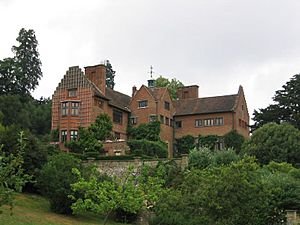
Churchill was responsible for cutting the cost of occupying the Middle East. He urged removing most British troops from Iraq. He wanted to install an Arab government. In March, he met British officials in Cairo. They agreed to make Faisal King of Iraq. His brother, Abdullah, would be King of Transjordan. From there, he traveled to Mandatory Palestine. Arab Palestinians asked him not to allow more Jewish migration. Churchill supported Zionism. He believed he could encourage Jewish migration while calming Arab fears. Only after the 1921 Jaffa riots did he agree to temporary limits on Jewish migration. Turkey wanted to expand into areas lost during World War I. Churchill backed Lloyd George in keeping British control of Constantinople. Turkish troops advanced towards the British. This led to the Chanak Crisis. Churchill called on British troops to stand firm.
In late 1921, Lloyd George made Churchill head of a committee. This committee would decide how much military spending could be cut. In December 1921, Churchill vacationed in France. He began writing a book about his World War I experiences. In September 1922, his fifth child, Mary, was born. That month, he bought a new house, Chartwell, in Kent. In October 1922, Churchill had an operation for appendicitis. While he was recovering, the Conservatives left Lloyd George's government. This led to the November 1922 general election. Churchill lost his Dundee seat. He came fourth in the votes.
Out of Parliament: 1922–1924
Churchill spent the next six months mostly in France. He focused on painting and writing his memoirs. He wrote a five-volume series of books about the war. It was called The World Crisis. The first book came out in April 1923. The others were published over ten years. A general election was called in 1923. Seven Liberal groups asked Churchill to be their candidate. He chose Leicester West. He did not win the seat. A Labour government led by Ramsay MacDonald took power. Churchill had hoped a Conservative and Liberal team would keep them out. He strongly opposed the MacDonald government's plan to loan money to Soviet Russia. He also feared signing a treaty with the Soviets.
In 1924, Churchill ran as an independent candidate. This was in the Westminster Abbey by-election. But he was defeated. In May, he spoke at a Conservative meeting in Liverpool. This was his first time speaking to a Conservative group in twenty years. He said the Liberal Party was no longer important in British politics. He urged Liberals to support the Conservatives. He wanted them to stop Labour and prevent "Socialism." In July, he agreed with Conservative leader Stanley Baldwin. He would be chosen as the Conservative candidate for a seat. In September, he was chosen for Epping. But he did not have to run as a Conservative. Instead, he called himself a "Constitutionalist." The general election happened in October. Churchill won in Epping. The Conservatives won the election. Baldwin formed the new government. Churchill had no experience in finance. But Baldwin appointed him as Chancellor of the Exchequer on November 6, 1924. Churchill moved into 11 Downing Street. He officially rejoined the Conservative Party.
|


